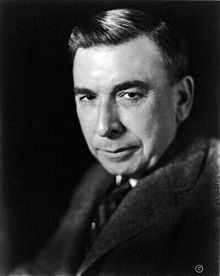
Back Booth Tarkington Afrikaans Booth Tarkington AVK بوث تارکینقتن AZB বুথ টার্কিংটন Bengali/Bangla Booth Tarkington Catalan Booth Tarkington Czech Booth Tarkington German Booth Tarkington Spanish Booth Tarkington Basque بوث تارکینگتن Persian
Booth Tarkington | |
|---|---|
 Booth Tarkington (1922) | |
| Born | Newton Booth Tarkington July 29, 1869 Indianapolis, Indiana, U.S. |
| Died | May 19, 1946 (aged 76) Indianapolis, Indiana, U.S. |
| Occupation | Novelist, dramatist |
| Education | Purdue University Princeton University |
| Years active | 1899–1946 |
| Notable works |
|
| Notable awards | Pulitzer Prize for Fiction (1919, 1922) |
| Spouse | Louisa Fletcher
(m. 1902; div. 1911)Susanah Keifer Robinson
(m. 1912) |
| Children | 1 |
| Signature | |
Newton Booth Tarkington (July 29, 1869 – May 19, 1946) was an American novelist and dramatist best known for his novels The Magnificent Ambersons (1918) and Alice Adams (1921). He is one of only four novelists to win the Pulitzer Prize for Fiction more than once, along with William Faulkner, John Updike, and Colson Whitehead. In the 1910s and 1920s he was considered the United States' greatest living author.[1] Several of his stories were adapted to film.
During the first quarter of the 20th century, Tarkington, along with Meredith Nicholson, George Ade, and James Whitcomb Riley helped to create a Golden Age of literature in Indiana.
Booth Tarkington served one term in the Indiana House of Representatives, was critical of the advent of automobiles, and set many of his stories in the Midwest. He eventually moved to Kennebunkport, Maine, where he continued his life work even as he suffered a loss of vision.[2]
He is often cited as an example of an author who enjoyed great success when alive, but whose reputation and influence did not survive his death.
- ^ Gottlieb, Robert (November 11, 2019). "The Rise and Fall of Booth Tarkington". The New Yorker. Retrieved November 17, 2019.
- ^ "Booth Tarkington Dies". The Indianapolis Star. May 20, 1946. p. 1. Retrieved October 25, 2021 – via Newspapers.com.